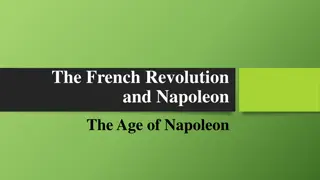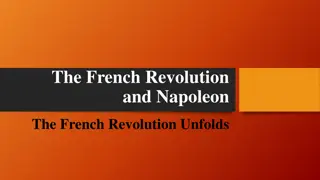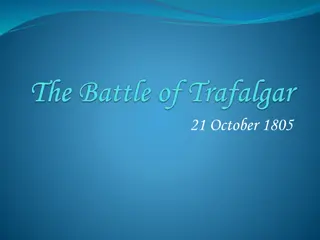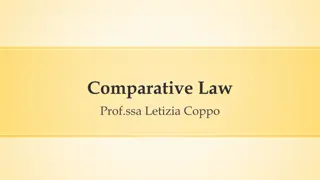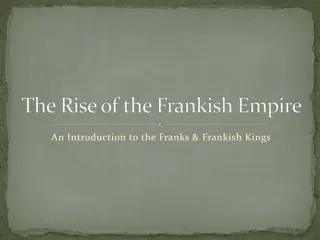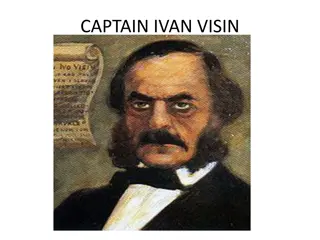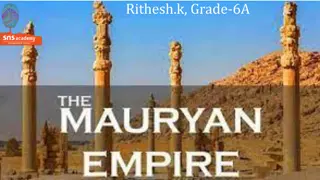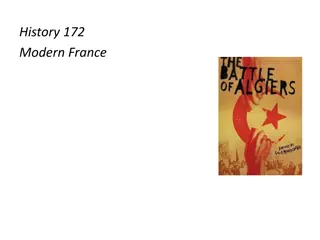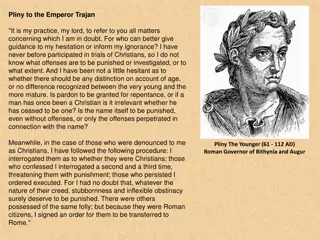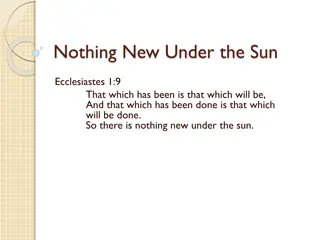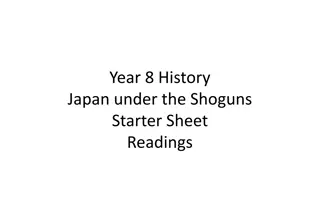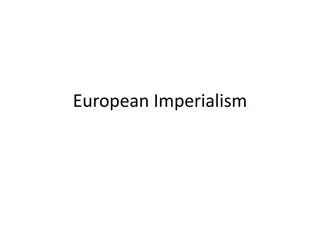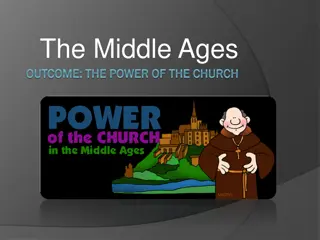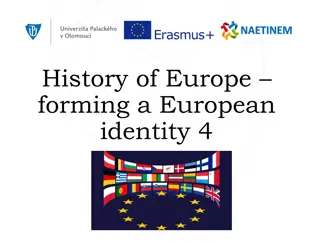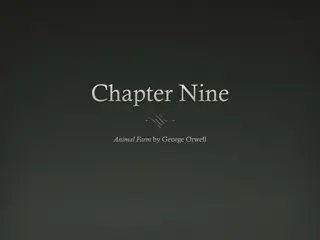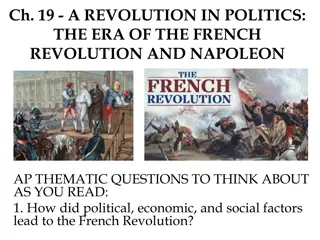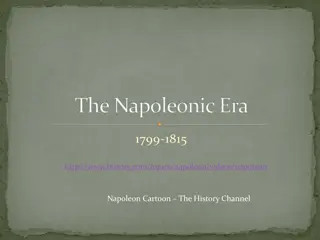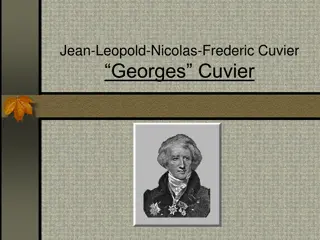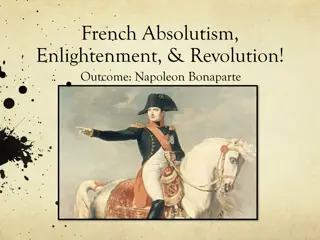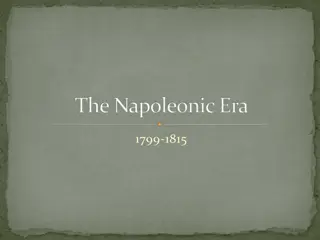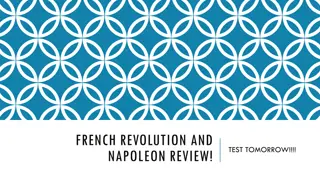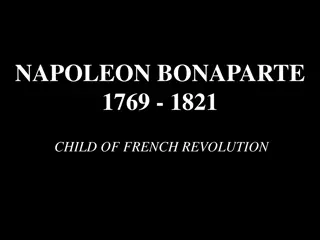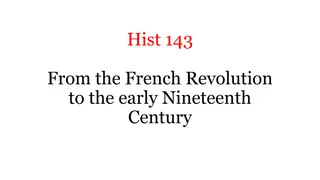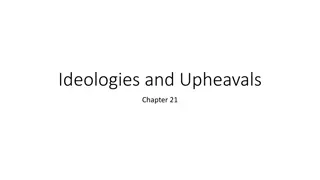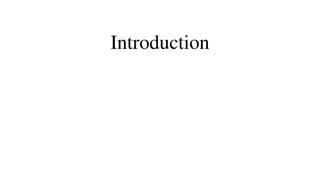Rise of Napoleon: From Revolution to Empire
Napoleon's rapid ascent to power, from his early military career during the French Revolution to crowning himself Emperor in 1804, marked by strategic victories, political maneuvers, and absolute rule that garnered both admiration and criticism.
1 views • 34 slides
The French Revolution and Napoleon: Unfolding of a Historic Era
The French Revolution, marked by political crises, revolts, and the rise of Napoleon, unfolded through phases of moderation, radicalism, and reaction. Peasants revolted against nobles, Paris became a revolutionary center, and the National Assembly acted to end aristocratic privileges. Explore the tu
2 views • 24 slides
The Battle of Trafalgar: A Historic Naval Triumph
In 1805, the Battle of Trafalgar secured British naval supremacy and thwarted Napoleon's invasion plans. Admiral Horatio Nelson led the British fleet to victory, although losing his life in the process. The battle, marked by strategic maneuvers and fierce engagements, saw the British capturing enemy
1 views • 9 slides
Empagliflozin Effects on Heart Failure with Reduced Ejection Fraction: EMPEROR-Reduced Trial Overview
Empagliflozin's impact on cardiovascular and renal events in heart failure with reduced ejection fraction was assessed in the EMPEROR-Reduced trial led by Milton Packer, MD, and Faiez Zannad, MD. The trial, enriched for patients with severe left ventricular dysfunction, randomized participants to em
2 views • 22 slides
Rajput and Religious Policy of Mughal Emperors: Akbar vs. Aurangzeb
Akbar, the first Mughal emperor, pursued a diplomatic policy towards the Rajputs, aiming to bring them under his suzerainty while maintaining friendly relations. His successor, Aurangzeb, adopted a more aggressive approach, seeking to annex Rajput kingdoms due to religious differences. This shift in
0 views • 6 slides
Overview of the French Judicial System: Cour de Cassation
The French judicial system, including the Cour de Cassation, is independent of the executive and legislative powers. Cour de Cassation, established during the French Revolution, acts as a final arbitrator on legal disputes and ensures the proper interpretation of legislation. Lower courts can refer
3 views • 19 slides
The Rise of the Frankish Empire: A Journey Through History
Explore the fascinating history of the Frankish Empire from the conquest of Gaul by the Franks in the 5th century to the reign of Charlemagne as the Holy Roman Emperor. Discover key events such as Clovis I's unification of the Franks, Charles Martel's victory at the Battle of Tours, and Charlemagne'
4 views • 6 slides
Biography of Emperor Harsha: Reign and Achievements
Emperor Harsha, who came to the throne at 14, faced challenges but proved victorious against enemies like Shashanka, expanded his empire across North India, and fostered cultural and educational growth, notably with Nalanda University. His reign saw diplomatic successes, like befriending the King of
0 views • 10 slides
The Fascinating Journey of Captain Ivan Visin: A Naval Captain and Explorer
Ivan "Ivo" Visin, a naval captain and explorer born in the Bay of Kotor, circumnavigated the globe in his vessel Splendido from 1852 to 1859. His remarkable journey, documented in the book "Plovidba kapetana Iva Visina oko svijeta," started in Antwerp and concluded in Trieste. Visin's impressive fea
0 views • 6 slides
Overview of Mauryan Empire: Chandragupta, Bindusara, and Ashoka
Mauryan Empire, established by the Mauryas, was the first major empire in India, encompassing a vast territory and surpassing previous dynasties in land control. Chandragupta Maurya, Bindusara, and Ashoka were key emperors who shaped the empire's history. Chandragupta, supported by Chanakya, conquer
0 views • 13 slides
The Algerian War and Decolonization in Modern France
The Algerian War of Independence (1954-1962) marked a significant chapter in modern French history, leading to the decolonization of Algeria. The conflict involved brutal tactics, mass expropriations, and human rights violations, as France sought to exploit Algeria for economic gain. The rule over A
6 views • 34 slides
Ashoka: The Emperor Who Embraced Peace and Dhamma
Ashoka, the renowned emperor, transitioned from a military conqueror to a propagator of peace and Dhamma after witnessing the horrors of war. He spread his message through inscriptions in various languages, emphasizing non-violence, respect, and ethics. Despite diverse religions in his empire leadin
0 views • 8 slides
Distribution and Adaptation of Warm-Blooded Animals on Earth
The distribution of warm-blooded animals shows regularities based on their size and environmental adaptations. From the Fennec Fox in North Africa to the Emperor Penguin in Antarctica, different species have evolved to thrive in diverse habitats based on their morphological features. Bergmann's rule
1 views • 16 slides
Revolutionary Engine Technology Presentation
Innovative presentation showcasing the EMPEROR.I engine concept designed by Jakub Tifter, Jakub Pfeffer, and team. It introduces a revolutionary engine model powered by water and uranium, mimicking a small nuclear power plant. The presentation covers vehicle benefits, disadvantages, design, and engi
0 views • 9 slides
Fascinating World of Penguins
Explore the diverse habitats, unique characteristics, and survival strategies of penguins, from the majestic Emperor penguins in Antarctica to the adorable Little Blue penguins in Australia. Discover how they stay warm, why they are black, and the predators they face in the wild. Dive into the capti
0 views • 12 slides
Discussions on Christians, Justice, and the City of God
Pliny the Younger consults Emperor Trajan on handling Christian trials, Trajan advises on fair treatment. St. Augustine draws parallels between earthly and heavenly cities, highlighting the morality behind founding empires.
0 views • 11 slides
The Story of the Baguette: From Revolution to UNESCO Heritage
The baguette, a famous French stick, has a rich history dating back to the French Revolution. Originating from Vienna, it became a symbol of equality and was even chosen by Napoleon for his soldiers. Today, the baguette remains an iconic part of French cuisine, with millions sold globally each year.
0 views • 5 slides
Reflections on Time and History Through Biblical Narratives
The verses from Ecclesiastes and stories of Noah and King Josiah illustrate the recurring themes of destruction, repentance, and divine intervention throughout history. The mention of Roman Emperor Constantine highlights the changing tides of religious significance and power. These narratives serve
0 views • 12 slides
Japanese Feudalism Under the Shoguns: A Historical Overview
The period of feudalism in Japan from the 12th to the 19th century under the Shoguns is explored in this reading activity. It delves into the social structure, roles of different classes like daimyo, samurai, artisans, and merchants, as well as the power dynamics between the Emperor and the shogun.
1 views • 14 slides
European Imperialism in the Middle East: A Historical Overview
Empire of the Turks and the 18th-century Ottoman Empire played significant roles in the power dynamics of the region, with conflicts over control of the Black Sea and territories. Napoleon's expedition into Egypt further intensified European interest in the Middle East, impacting trade routes and re
0 views • 41 slides
French Revolution Warm-Up Series
This series of warm-up activities explores various aspects of the French Revolution, such as causes of revolt, key events, changes during different phases, and the roles of significant figures like Napoleon. Students are prompted to analyze political cartoons, identify estate characteristics, sequen
0 views • 9 slides
Influential Figures in Global History
Explore the lives of historical figures such as Alexander the Great, Montesquieu, Julius Caesar, John Calvin, Catherine the Great, Napoleon Bonaparte, Confucius, and Constantine. These individuals left a mark on different eras through their conquests, philosophies, reforms, and governance, shaping t
0 views • 27 slides
The Power of the Church in the Middle Ages
During the Middle Ages, the Church wielded significant power and influence. Christianity spread through missionary efforts and the Church became involved in politics, using its resources for various activities. Monasteries provided sanctuaries for monks and nuns devoted to serving God. The Church's
0 views • 7 slides
Timeline of Napoleon's Italian and Austrian Campaigns
This content delves into Napoleon's military campaigns in Italy and Austria, highlighting key battles such as Lodi, Arcola, Rivoli, Tagliamento, and Campo Formio. It also discusses the consequences of Napoleon's defeat and the Congress of Vienna. Additionally, it explores the geography of Napoleon's
0 views • 6 slides
European Identity Formation: Napoleon's Campaigns and Rise to Power
The history of Europe forming a European identity is exemplified through Napoleon Bonaparte's strategic campaigns in Northern Italy and Egypt. His victories against the Habsburgs strengthened his position, leading to acclaim upon his return to Paris. However, setbacks in Egypt and conflicts with Bri
0 views • 24 slides
Animal Farm Chapter Nine Summary and Analysis
In Chapter Nine of George Orwell's "Animal Farm," Boxer's health deteriorates, leading to a tragic event. Despite his hard work, rations are reduced for all except the pigs and dogs, who indulge in luxuries at the expense of others. The principles of Animalism are twisted to serve the pigs' greed, w
0 views • 11 slides
A Revolution in Politics: French Revolution and Its Impact
The content explores the political, economic, and social factors that led to the French Revolution, alongside thematic questions regarding the era of the French Revolution and Napoleon. It also delves into the causes and outcomes of the American Revolution and its impact on Europe, highlighting key
0 views • 12 slides
Rise and Reign of Napoleon Bonaparte: The Napoleonic Era 1799-1815
Explore the rise to power and reign of Napoleon Bonaparte, from his military achievements to becoming Emperor of France. Witness the pivotal moments like the coup d'état, establishment of the French Consulate, and his coronation. Discover Napoleon's reforms and impact during the Napoleonic Era.
0 views • 24 slides
Biography of Jean Leopold Nicolas Frederic Cuvier Georges
Jean Leopold Nicolas Frederic Cuvier Georges (1769-1832) was a prominent French naturalist known for his work in comparative anatomy and paleontology. He rejected evolutionary theories of his time, proposing the theory of Correlation of Parts. Cuvier's career involved teaching, research at the Museu
0 views • 18 slides
Napoleon Bonaparte: Rise to Power and Rule of France
Napoleon Bonaparte, born in 1769 in Corsica, rose to become a successful military leader and eventually seized power in France through a coup d'état in 1799. He ruled as the first consul, implementing reforms and establishing his authority. Napoleon's rule saw the creation of the Napoleonic Code an
0 views • 36 slides
The Rise and Reign of Napoleon Bonaparte (1799-1815)
Napoleon Bonaparte's ascent to power from military general to Emperor of France during the Napoleonic Era marked by coups, reforms, and controversial coronation. His reign brought significant reforms to economy, society, and religion, focusing on economic stability, social order, religious freedoms,
0 views • 26 slides
French Revolution and Napoleon Review Test Tomorrow!
Get ready for your test on the French Revolution and Napoleon with a review of key facts including leaders, events, and terms such as Robespierre, Jacobins, emigres, San Culottes, Jean-Paul Marat, Old Regime, causes of the revolution, and more. Study well for success!
0 views • 49 slides
Ancient Israel & Early Christianity in Jeopardy
Explore the historical and religious significance of Ancient Israel and Early Christianity through Jeopardy! questions on topics like the Ten Commandments, Hebrew Bible, Emergence of Christianity, and more. Delve into the stories of figures like Jesus Christ, Abraham, and the Roman Emperor Constanti
0 views • 19 slides
Conflict and Leadership in George Orwell's Animal Farm
In George Orwell's novel Animal Farm, the leaders Napoleon and Snowball clash due to their contrasting ideologies. Napoleon prioritizes his own power and uses extreme methods, while Snowball cares for the well-being of all animals. The story reflects the Russian Revolution, where power corrupts Napo
0 views • 9 slides
Exploring Classic Fairy Tales and Stories
Explore a collection of classic fairy tales and stories including "The Ugly Duckling," "The Emperor's New Clothes," "Snow White," "Little Red Riding Hood," and more. Dive into the enchanting worlds created by renowned authors like Andersen and the Grimm Brothers. Discuss your favorite stories, lesso
0 views • 19 slides
Napoleon Bonaparte: A Revolutionary Leader and Reformer
Napoleon Bonaparte, born in 1769, emerged as a key figure during the French Revolution and played significant roles in the National Convention, the Directory, and the Consulate. He implemented various reforms in administration, finance, education, and religion, and led successful military campaigns
0 views • 16 slides
Exploring Taj Mahal: English Lesson Plan for Class 6 Students
Dive into the world of Emperor Shah Jahan and his beloved Empress Mumtaz through this English lesson plan for Class 6 students. Discover the historical significance of the Taj Mahal, enhance vocabulary, engage in group discussions, and test your knowledge with evaluation questions. Finish off by wri
0 views • 13 slides
Europe from French Revolution to Revolutions of 1848
From the French Revolution to the early nineteenth century, Europe saw significant political changes, including the rise of Napoleon Bonaparte, the Congress of Vienna in 1815, and subsequent revolutions like the 1830 French Revolution and the Revolutions of 1848 that spread across Europe, shaping th
0 views • 6 slides
Ideologies and Upheavals: Congress of Vienna and Impact
The Congress of Vienna, a gathering of key European powers, aimed to establish lasting peace after Napoleon's defeat. Key agreements included territorial compensation, restoration of monarchs, and the formation of the Holy Alliance. While successful in preventing major wars, the Congress lacked fore
0 views • 19 slides
Historical Events of the 18th Century
Explore significant historical events of the 18th century, including political upheavals, revolutionary movements, and societal changes. From the American Declaration of Independence to the abolition of the slave trade and the rise of Napoleon, witness the unfolding of momentous events that shaped t
0 views • 38 slides
